Unit 6 When was it invented Section A3 (Grammar focus-4c) 优学案(含答案)
文档属性
| 名称 | Unit 6 When was it invented Section A3 (Grammar focus-4c) 优学案(含答案) |
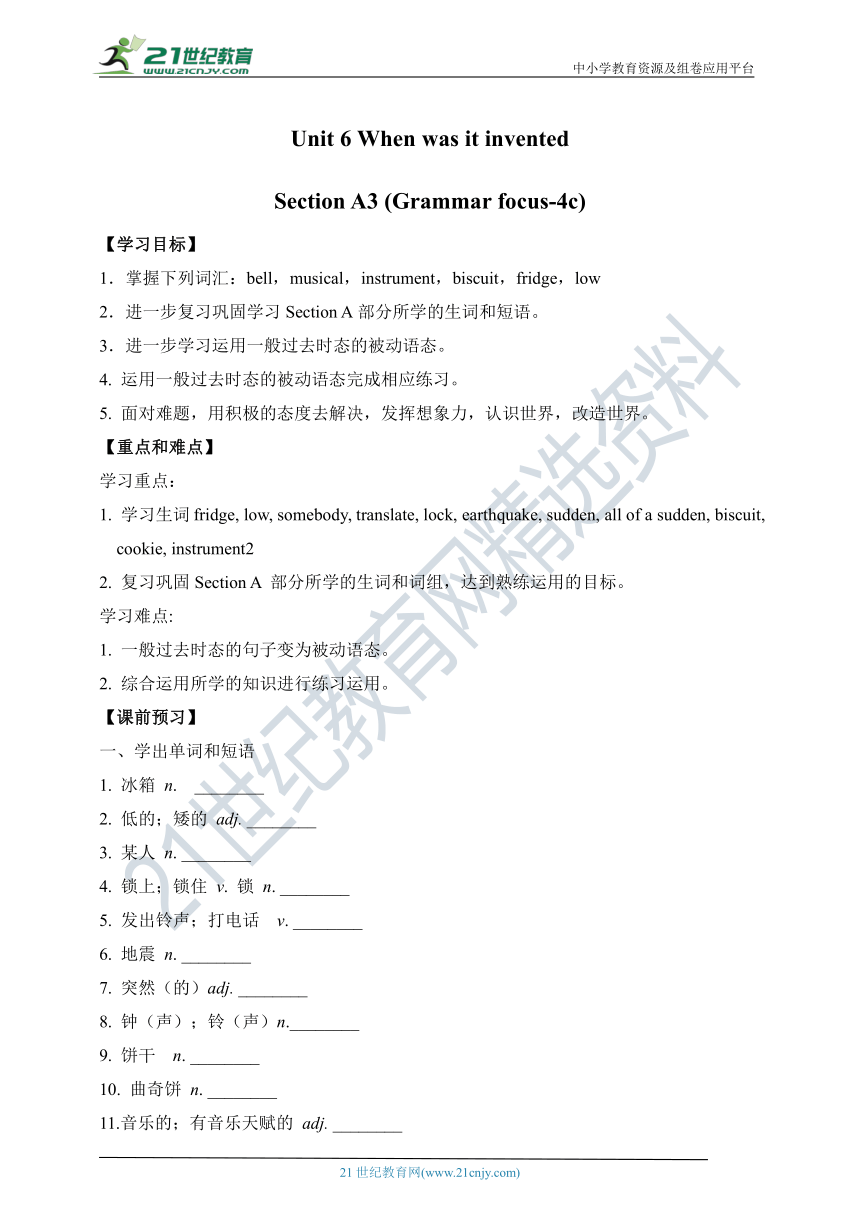
|
|
| 格式 | zip | ||
| 文件大小 | 1.1MB | ||
| 资源类型 | 试卷 | ||
| 版本资源 | 人教新目标(Go for it)版 | ||
| 科目 | 英语 | ||
| 更新时间 | 2019-08-13 10:21:35 | ||
图片预览

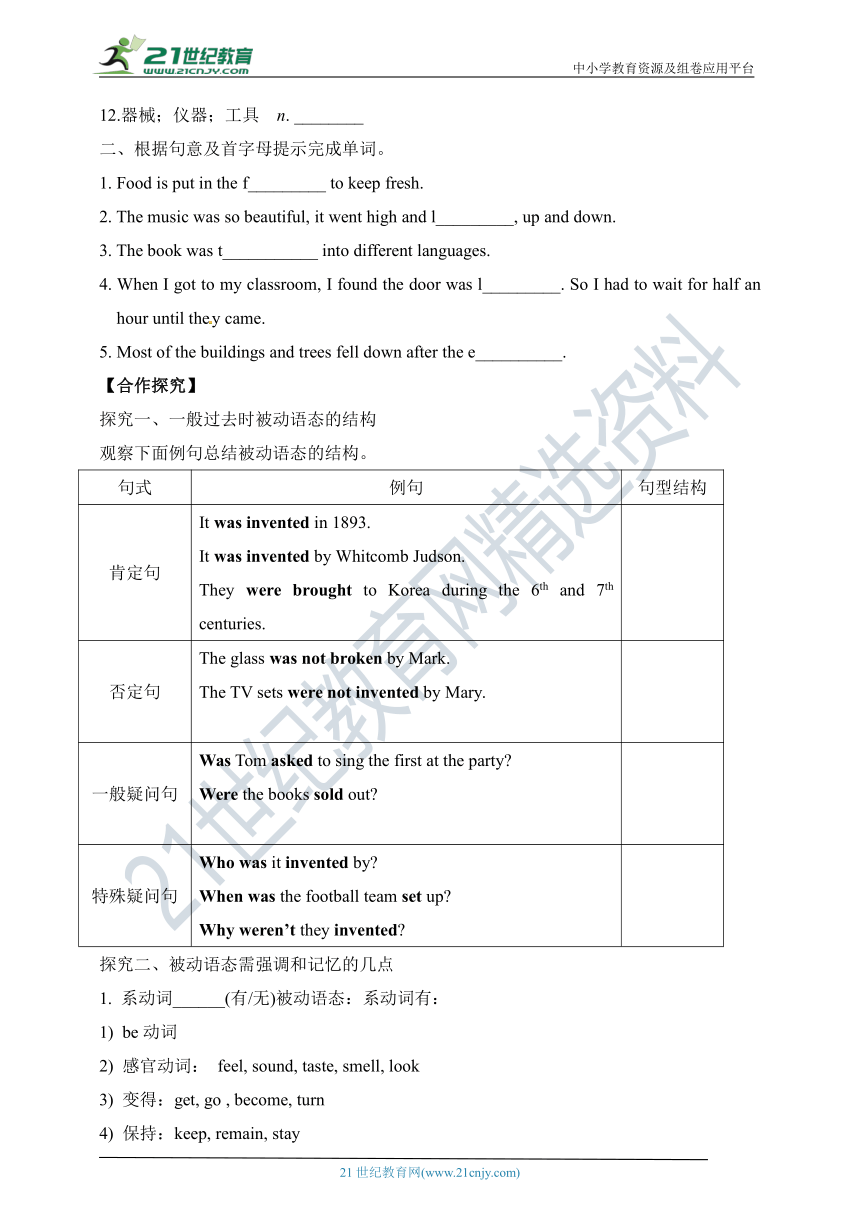
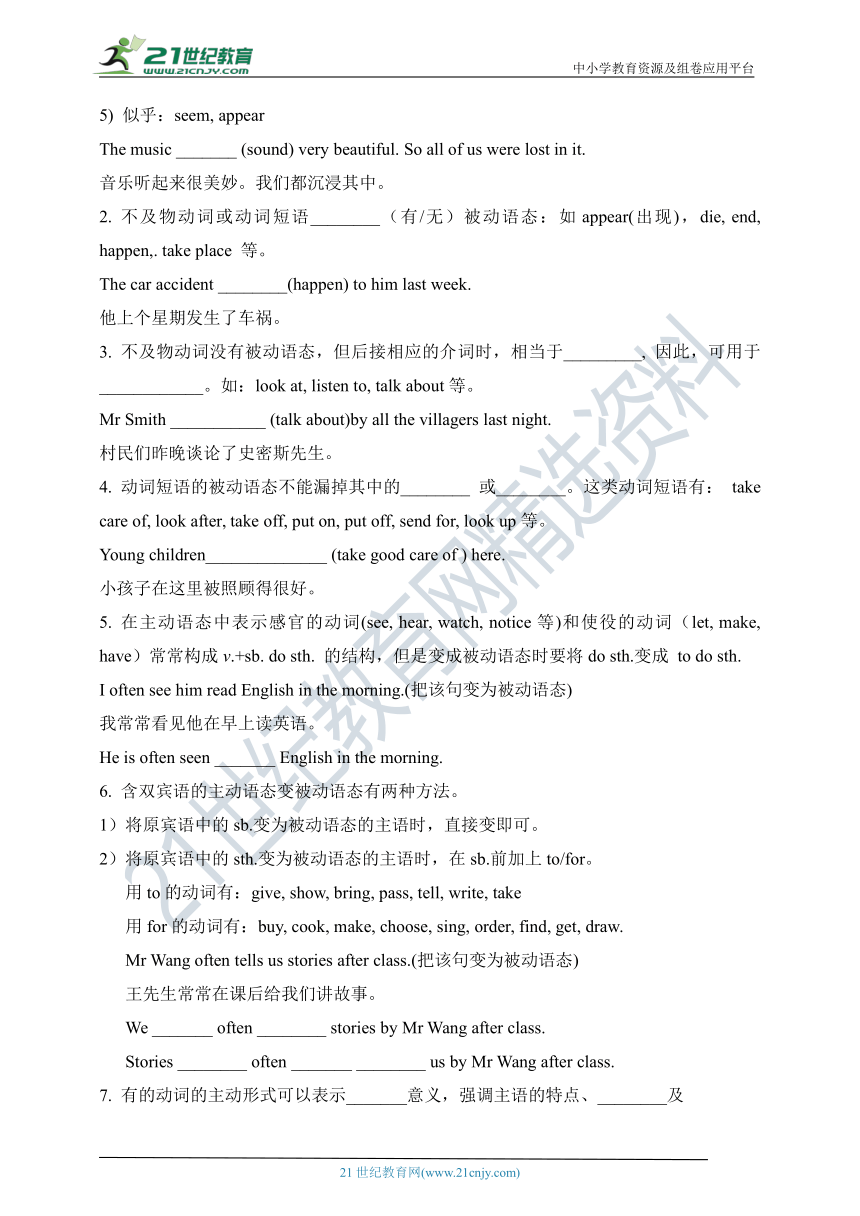
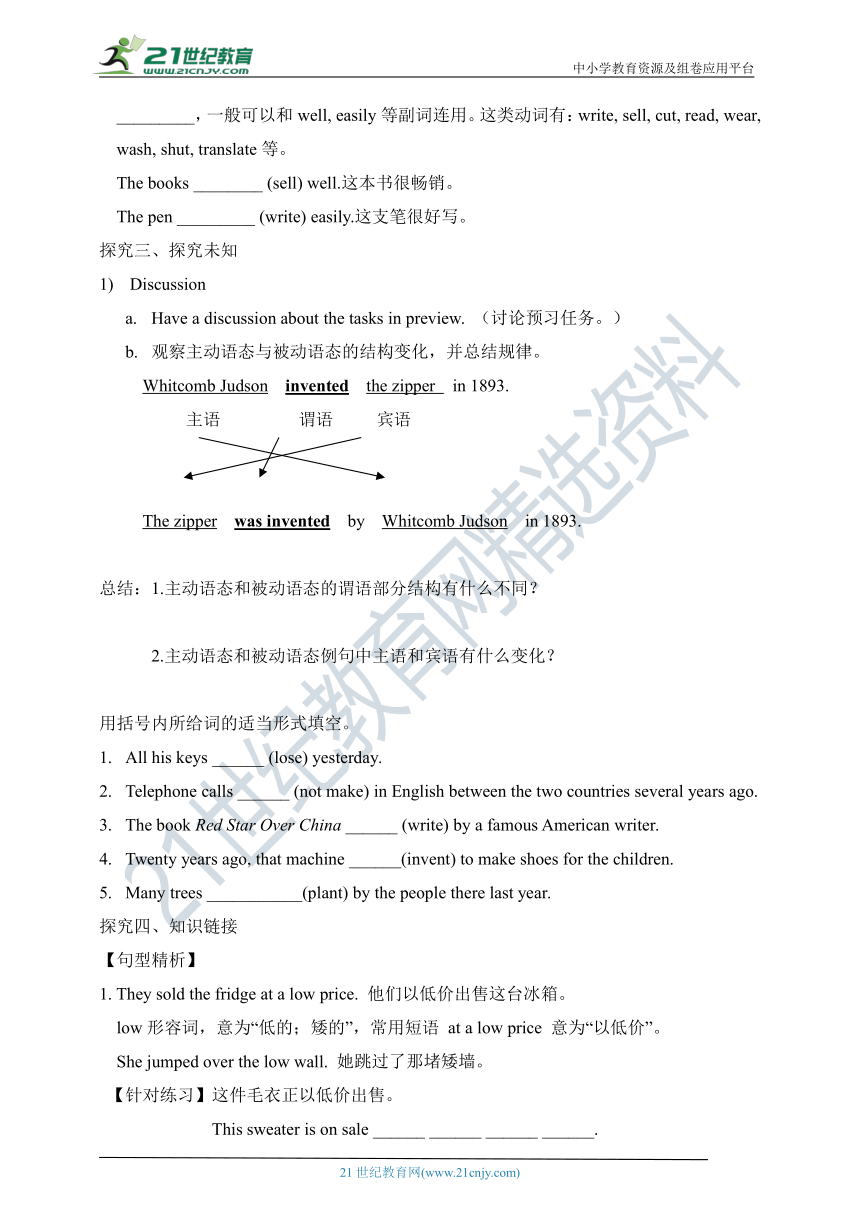
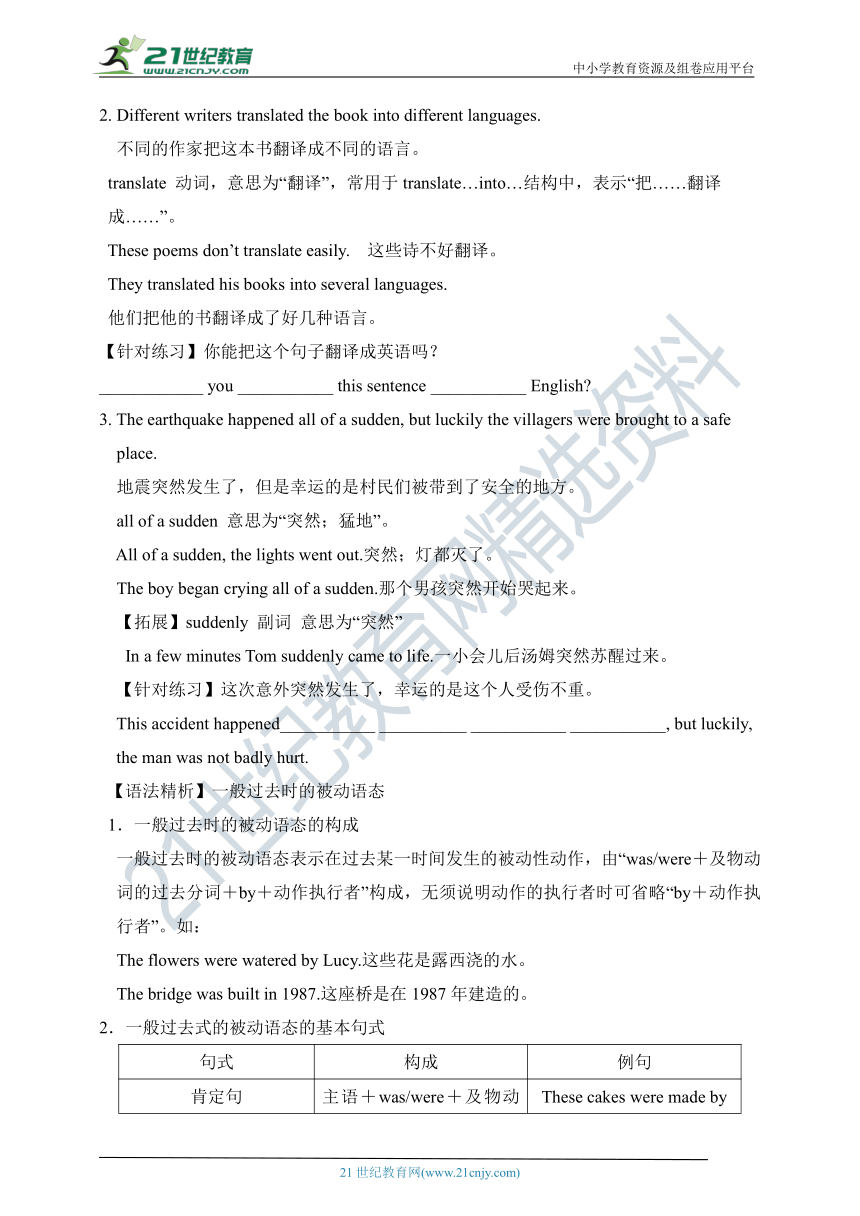
文档简介
Unit 6 When was it invented
Section A3 (Grammar focus-4c)
【学习目标】
1.掌握下列词汇:bell,musical,instrument,biscuit,fridge,low
2.进一步复习巩固学习Section A部分所学的生词和短语。
3.进一步学习运用一般过去时态的被动语态。
4. 运用一般过去时态的被动语态完成相应练习。
5. 面对难题,用积极的态度去解决,发挥想象力,认识世界,改造世界。
【重点和难点】
学习重点:
1. 学习生词fridge, low, somebody, translate, lock, earthquake, sudden, all of a sudden, biscuit, cookie, instrument2
2. 复习巩固Section A 部分所学的生词和词组,达到熟练运用的目标。
学习难点:
1. 一般过去时态的句子变为被动语态。
2. 综合运用所学的知识进行练习运用。
【课前预习】
一、学出单词和短语
1. 冰箱 n. ________
2. 低的;矮的 adj. ________
3. 某人 n. ________
4. 锁上;锁住 v. 锁 n. ________
5. 发出铃声;打电话 v. ________
6. 地震 n. ________
7. 突然(的)adj. ________
8. 钟(声);铃(声)n.________
9. 饼干 n. ________
10. 曲奇饼 n. ________
11.音乐的;有音乐天赋的 adj. ________
12.器械;仪器;工具 n. ________
二、根据句意及首字母提示完成单词。
1. Food is put in the f_________ to keep fresh.
2. The music was so beautiful, it went high and l_________, up and down.
3. The book was t___________ into different languages.
4. When I got to my classroom, I found the door was l_________. So I had to wait for half an hour until they came.
5. Most of the buildings and trees fell down after the e__________.
【合作探究】
探究一、一般过去时被动语态的结构
观察下面例句总结被动语态的结构。
句式
例句
句型结构
肯定句
It was invented in 1893.
It was invented by Whitcomb Judson.
They were brought to Korea during the 6th and 7th centuries.
否定句
The glass was not broken by Mark.
The TV sets were not invented by Mary.
一般疑问句
Was Tom asked to sing the first at the party?
Were the books sold out?
特殊疑问句
Who was it invented by?
When was the football team set up?
Why weren’t they invented?
探究二、被动语态需强调和记忆的几点
系动词______(有/无)被动语态:系动词有:
be动词
感官动词: feel, sound, taste, smell, look
变得:get, go , become, turn
保持:keep, remain, stay
似乎:seem, appear
The music _______ (sound) very beautiful. So all of us were lost in it.
音乐听起来很美妙。我们都沉浸其中。
不及物动词或动词短语________(有/无)被动语态:如appear(出现),die, end, happen,. take place 等。
The car accident ________(happen) to him last week.
他上个星期发生了车祸。
不及物动词没有被动语态,但后接相应的介词时,相当于_________, 因此,可用于____________。如:look at, listen to, talk about等。
Mr Smith ___________ (talk about)by all the villagers last night.
村民们昨晚谈论了史密斯先生。
动词短语的被动语态不能漏掉其中的________ 或________。这类动词短语有: take care of, look after, take off, put on, put off, send for, look up等。
Young children______________ (take good care of ) here.
小孩子在这里被照顾得很好。
在主动语态中表示感官的动词(see, hear, watch, notice等)和使役的动词(let, make, have)常常构成v.+sb. do sth. 的结构,但是变成被动语态时要将do sth.变成 to do sth.
I often see him read English in the morning.(把该句变为被动语态)
我常常看见他在早上读英语。
He is often seen _______ English in the morning.
含双宾语的主动语态变被动语态有两种方法。
将原宾语中的sb.变为被动语态的主语时,直接变即可。
将原宾语中的sth.变为被动语态的主语时,在sb.前加上to/for。
用to的动词有:give, show, bring, pass, tell, write, take
用for的动词有:buy, cook, make, choose, sing, order, find, get, draw.
Mr Wang often tells us stories after class.(把该句变为被动语态)
王先生常常在课后给我们讲故事。
We _______ often ________ stories by Mr Wang after class.
Stories ________ often _______ ________ us by Mr Wang after class.
有的动词的主动形式可以表示_______意义,强调主语的特点、________及
_________,一般可以和well, easily等副词连用。这类动词有:write, sell, cut, read, wear, wash, shut, translate等。
The books ________ (sell) well.这本书很畅销。
The pen _________ (write) easily.这支笔很好写。
探究三、探究未知
Discussion
Have a discussion about the tasks in preview. (讨论预习任务。)
观察主动语态与被动语态的结构变化,并总结规律。
Whitcomb Judson invented the zipper in 1893.
主语 谓语 宾语
The zipper was invented by Whitcomb Judson in 1893.
总结:1.主动语态和被动语态的谓语部分结构有什么不同?
2.主动语态和被动语态例句中主语和宾语有什么变化?
用括号内所给词的适当形式填空。
All his keys ______ (lose) yesterday.
Telephone calls ______ (not make) in English between the two countries several years ago.
The book Red Star Over China ______ (write) by a famous American writer.
Twenty years ago, that machine ______(invent) to make shoes for the children.
Many trees ___________(plant) by the people there last year.
探究四、知识链接
【句型精析】
1. They sold the fridge at a low price. 他们以低价出售这台冰箱。
low形容词,意为“低的;矮的”,常用短语 at a low price 意为“以低价”。
She jumped over the low wall. 她跳过了那堵矮墙。
【针对练习】这件毛衣正以低价出售。
This sweater is on sale ______ ______ ______ ______.
2. Different writers translated the book into different languages.
不同的作家把这本书翻译成不同的语言。
translate 动词,意思为“翻译”,常用于translate…into…结构中,表示“把……翻译成……”。
These poems don’t translate easily. 这些诗不好翻译。
They translated his books into several languages.
他们把他的书翻译成了好几种语言。
【针对练习】你能把这个句子翻译成英语吗?
____________ you ___________ this sentence ___________ English?
3. The earthquake happened all of a sudden, but luckily the villagers were brought to a safe place.
地震突然发生了,但是幸运的是村民们被带到了安全的地方。
all of a sudden 意思为“突然;猛地”。
All of a sudden, the lights went out.突然;灯都灭了。
The boy began crying all of a sudden.那个男孩突然开始哭起来。
【拓展】suddenly 副词 意思为“突然”
In a few minutes Tom suddenly came to life.一小会儿后汤姆突然苏醒过来。
【针对练习】这次意外突然发生了,幸运的是这个人受伤不重。
This accident happened___________ __________ ___________ ___________, but luckily, the man was not badly hurt.
【语法精析】一般过去时的被动语态
1.一般过去时的被动语态的构成
一般过去时的被动语态表示在过去某一时间发生的被动性动作,由“was/were+及物动词的过去分词+by+动作执行者”构成,无须说明动作的执行者时可省略“by+动作执行者”。如:
The flowers were watered by Lucy.这些花是露西浇的水。
The bridge was built in 1987.这座桥是在1987年建造的。
2.一般过去式的被动语态的基本句式
句式
构成
例句
肯定句
主语+was/were+及物动词的过去分词(+其他).
These cakes were made by my sister last night.这些蛋糕是我的姐姐昨晚做的。
否定句
主语+was/were+not+及物动词的过去分词(+其他).
The watch was not found yesterday afternoon.那块手表昨天下午没有被找到。
一般
疑问
句及
答语
Was/Were+主语+及物动词的过去分词(+其他)?
肯定回答:Yes,主语+was/were.
否定回答:主语+wasn't/weren't.
—Was the book written in English?这本书是用英语写的吗?
—Yes,it was.是的,它是。
—No,it wasn't.不,它不是。
特殊
疑问
句
特殊疑问词+was/were+主语+及物动词的过去分词(+其他)?
When were the photos taken?这些照片是什么时候拍的?
Where was the pet dog found?那个宠物狗是在哪儿被发现的?
3. 使用被动语态的注意事项
(1)含有双宾语的主动结构变被动结构时,不要忽略间接宾语前的介词。如:
We gave some flowers to Miss Gao on Teachers' Day.
教师节那天,我们给高老师送了一些花。
→Some flowers were given to Miss Gao on Teachers' Day.
【注意】含有双宾语的主动结构变被动结构时,既可将间接宾语转化为主语,也可将直接宾语转化为主语。若将间接宾语转化为主语,则保留直接宾语;若将直接宾语转化为主语,则保留间接宾语,且在被保留的间接宾语前加上介词to或for。如:
My mother gave me a pencil.妈妈送给我一支铅笔。
→I was given a pencil by my mother.
→A pencil was given to me by my mother.
(2) 含有动词短语的主动结构变被动结构时,不要漏掉短语中的介词或副词。如:
We handed in our homework last Friday.上周五我们上交了家庭作业。
→Our homework was handed in last Friday.
(3) 在含有使役动词(make,let等)或感官动词(see,watch,notice,hear等)的主动语态的句子中,这些词后常跟省略to的动词不定式,但改为被动语态时要把省去的to还原。如:
I saw him cross the road and enter the shop.我看到他穿过马路进入了商店。
→He was seen to cross the road and enter the shop.
【课时小结】
重点单词
1. fridge (n.)冰箱
2. low (adj.)低的;矮的
3. somebody (pron. & n.)某人;重要人物
4. translate(v.)翻译
5. lock(v.)锁上;锁住(n.)锁
6. earthquake(n.)地震
7. sudden (adj.) 突然(的)
8. biscuit (n.) 饼干
9. cookie (n.) 曲奇饼
10. instrument (n.) 器械;仪器;工具
重点词组
1. at a low price 以一个很低的价格
2. take these photos 拍这些照片
3. go out alone 单独外出
4. translate the book into different language 把书翻译成不同的语言
5. all of a sudden 突然;猛地
6. work on 从事,进行
重点句式
1. —When was the zipper invented? 拉链是什么时候发明的?
—It was invented in 1893. 它是在1893年被发明的。
2. —Who was it invented by? 它是由谁发明的?
—It was invented by Whitcomb Judson. 它是被惠特科姆?贾德森发明的。
3. The fridge was sold at a low price.
这个冰箱以低价被卖掉了。
4. The students were told not to eat or drink in class.
学生们被告知在课堂上既不吃或喝任何东西。
【达标检测】
一、根据句意及所给汉语提示,写出句中所缺单词。
1. The ________(饼干) taste delicious. May I have some more?
2. My mother ________(怀疑) if he was a real policeman.
3. People usually put food in the ________(冰箱) to keep it fresh in summer.
4. What were you doing when the ________(地震) happened?
5. Jane went to work on foot after she ________(锁上) the door.
二、 根据汉语意思完成英语句子,每空一词。
1. 突然我听到一个小孩在公园里哭。
________ ________ ________ ________, I heard a child crying in the park.
2. 争吵发生在一个周日的早上。
The argument ________ ________ on a Sunday morning.
3. 林涛在花园里意外地找到了他的手表。
Lin Tao found his watch ________ ________ in the garden.
4. 毫无疑问,他是世界上最著名的科学家之一。
He is ________ ________ one of the most famous scientists in the world.
5. 据说今天一辆公共汽车落入了湖中。
________ ________ ________ that a bus fell into the lake today.
6. 你能把他的话翻译成汉语吗?
Can you ________ his words ________ Chinese?
三、将下列句子改为被动语态。
1. Mr. Green wrote two books last year.
____________________________________________
2. She saw them come into the room.
____________________________________________
3. Mary bought him some flowers.
___________________________________________
4. They looked for that set of keys just now.
____________________________________________
5. He brought a radio to school today.
____________________________________________
【自我评价】
1. 本课我学会了什么?
_____________________________________
2. 通过本课的学习,我还有哪些疑问?
___________________________________________
参考答案:
【课前预习】
一、1. fridge 2. low 3. somebody 4. Lock 5. ring 6.earthquake
7. sudden 8. bell 9. biscuit 10.cookie 11. Musical 12.instrument
二、1. fridge 2. low 3. translated 4. locked 5. earthquake
探究一
肯定句:主语+was/were+及物动词的过去分词(+其他).
否定句:主语+was/were+not+及物动词的过去分词(+其他).
一般疑问:Was/Were+主语+及物动词的过去分词(+其他)?
特殊疑问句:特殊疑问词+was/were+主语+及物动词的过去分词(+其他)?
探究二
1. 无; sounds;
2. 无;happened
3. 及物动词:被动语态;was talked
4. 介词或副词;are taken care of
5. to read
6. are; told; are told to
7. 被动;特征及性质
sells; writes
探究三
总结:
1. 把谓语变成被动结构(be+过去分词)(根据被动语态句子里的主语的人称和数,以及原来主动语态句子中动词的时态来决定be的形式)
2. 把主动语态的宾语变为被动语态的主语;把主动语态的宾语变为被动语态的主语。
1. were lost
2. were not made
3. was written
4. was invented
5. were planted
探究四
【句型精析】
1. at a low price 2. Can; translate; into 3. all of a sudden
【达标检测】
一、1. biscuits? 2. doubted? 3. fridge? 4. earthquake 5. locked
二、1. All of a sudden? 2. took place? 3. by accident?
4. without doubt? 5. It is said? 6. translate; into
三、1. Two books were written by Mr. Green last year.
2. They were seen to come into the room by her.
3. Some flowers were bought for him by Mary.
4. That set of keys was looked for by them just now.
5. A radio was brought to school by him today.
Section A3 (Grammar focus-4c)
【学习目标】
1.掌握下列词汇:bell,musical,instrument,biscuit,fridge,low
2.进一步复习巩固学习Section A部分所学的生词和短语。
3.进一步学习运用一般过去时态的被动语态。
4. 运用一般过去时态的被动语态完成相应练习。
5. 面对难题,用积极的态度去解决,发挥想象力,认识世界,改造世界。
【重点和难点】
学习重点:
1. 学习生词fridge, low, somebody, translate, lock, earthquake, sudden, all of a sudden, biscuit, cookie, instrument2
2. 复习巩固Section A 部分所学的生词和词组,达到熟练运用的目标。
学习难点:
1. 一般过去时态的句子变为被动语态。
2. 综合运用所学的知识进行练习运用。
【课前预习】
一、学出单词和短语
1. 冰箱 n. ________
2. 低的;矮的 adj. ________
3. 某人 n. ________
4. 锁上;锁住 v. 锁 n. ________
5. 发出铃声;打电话 v. ________
6. 地震 n. ________
7. 突然(的)adj. ________
8. 钟(声);铃(声)n.________
9. 饼干 n. ________
10. 曲奇饼 n. ________
11.音乐的;有音乐天赋的 adj. ________
12.器械;仪器;工具 n. ________
二、根据句意及首字母提示完成单词。
1. Food is put in the f_________ to keep fresh.
2. The music was so beautiful, it went high and l_________, up and down.
3. The book was t___________ into different languages.
4. When I got to my classroom, I found the door was l_________. So I had to wait for half an hour until they came.
5. Most of the buildings and trees fell down after the e__________.
【合作探究】
探究一、一般过去时被动语态的结构
观察下面例句总结被动语态的结构。
句式
例句
句型结构
肯定句
It was invented in 1893.
It was invented by Whitcomb Judson.
They were brought to Korea during the 6th and 7th centuries.
否定句
The glass was not broken by Mark.
The TV sets were not invented by Mary.
一般疑问句
Was Tom asked to sing the first at the party?
Were the books sold out?
特殊疑问句
Who was it invented by?
When was the football team set up?
Why weren’t they invented?
探究二、被动语态需强调和记忆的几点
系动词______(有/无)被动语态:系动词有:
be动词
感官动词: feel, sound, taste, smell, look
变得:get, go , become, turn
保持:keep, remain, stay
似乎:seem, appear
The music _______ (sound) very beautiful. So all of us were lost in it.
音乐听起来很美妙。我们都沉浸其中。
不及物动词或动词短语________(有/无)被动语态:如appear(出现),die, end, happen,. take place 等。
The car accident ________(happen) to him last week.
他上个星期发生了车祸。
不及物动词没有被动语态,但后接相应的介词时,相当于_________, 因此,可用于____________。如:look at, listen to, talk about等。
Mr Smith ___________ (talk about)by all the villagers last night.
村民们昨晚谈论了史密斯先生。
动词短语的被动语态不能漏掉其中的________ 或________。这类动词短语有: take care of, look after, take off, put on, put off, send for, look up等。
Young children______________ (take good care of ) here.
小孩子在这里被照顾得很好。
在主动语态中表示感官的动词(see, hear, watch, notice等)和使役的动词(let, make, have)常常构成v.+sb. do sth. 的结构,但是变成被动语态时要将do sth.变成 to do sth.
I often see him read English in the morning.(把该句变为被动语态)
我常常看见他在早上读英语。
He is often seen _______ English in the morning.
含双宾语的主动语态变被动语态有两种方法。
将原宾语中的sb.变为被动语态的主语时,直接变即可。
将原宾语中的sth.变为被动语态的主语时,在sb.前加上to/for。
用to的动词有:give, show, bring, pass, tell, write, take
用for的动词有:buy, cook, make, choose, sing, order, find, get, draw.
Mr Wang often tells us stories after class.(把该句变为被动语态)
王先生常常在课后给我们讲故事。
We _______ often ________ stories by Mr Wang after class.
Stories ________ often _______ ________ us by Mr Wang after class.
有的动词的主动形式可以表示_______意义,强调主语的特点、________及
_________,一般可以和well, easily等副词连用。这类动词有:write, sell, cut, read, wear, wash, shut, translate等。
The books ________ (sell) well.这本书很畅销。
The pen _________ (write) easily.这支笔很好写。
探究三、探究未知
Discussion
Have a discussion about the tasks in preview. (讨论预习任务。)
观察主动语态与被动语态的结构变化,并总结规律。
Whitcomb Judson invented the zipper in 1893.
主语 谓语 宾语
The zipper was invented by Whitcomb Judson in 1893.
总结:1.主动语态和被动语态的谓语部分结构有什么不同?
2.主动语态和被动语态例句中主语和宾语有什么变化?
用括号内所给词的适当形式填空。
All his keys ______ (lose) yesterday.
Telephone calls ______ (not make) in English between the two countries several years ago.
The book Red Star Over China ______ (write) by a famous American writer.
Twenty years ago, that machine ______(invent) to make shoes for the children.
Many trees ___________(plant) by the people there last year.
探究四、知识链接
【句型精析】
1. They sold the fridge at a low price. 他们以低价出售这台冰箱。
low形容词,意为“低的;矮的”,常用短语 at a low price 意为“以低价”。
She jumped over the low wall. 她跳过了那堵矮墙。
【针对练习】这件毛衣正以低价出售。
This sweater is on sale ______ ______ ______ ______.
2. Different writers translated the book into different languages.
不同的作家把这本书翻译成不同的语言。
translate 动词,意思为“翻译”,常用于translate…into…结构中,表示“把……翻译成……”。
These poems don’t translate easily. 这些诗不好翻译。
They translated his books into several languages.
他们把他的书翻译成了好几种语言。
【针对练习】你能把这个句子翻译成英语吗?
____________ you ___________ this sentence ___________ English?
3. The earthquake happened all of a sudden, but luckily the villagers were brought to a safe place.
地震突然发生了,但是幸运的是村民们被带到了安全的地方。
all of a sudden 意思为“突然;猛地”。
All of a sudden, the lights went out.突然;灯都灭了。
The boy began crying all of a sudden.那个男孩突然开始哭起来。
【拓展】suddenly 副词 意思为“突然”
In a few minutes Tom suddenly came to life.一小会儿后汤姆突然苏醒过来。
【针对练习】这次意外突然发生了,幸运的是这个人受伤不重。
This accident happened___________ __________ ___________ ___________, but luckily, the man was not badly hurt.
【语法精析】一般过去时的被动语态
1.一般过去时的被动语态的构成
一般过去时的被动语态表示在过去某一时间发生的被动性动作,由“was/were+及物动词的过去分词+by+动作执行者”构成,无须说明动作的执行者时可省略“by+动作执行者”。如:
The flowers were watered by Lucy.这些花是露西浇的水。
The bridge was built in 1987.这座桥是在1987年建造的。
2.一般过去式的被动语态的基本句式
句式
构成
例句
肯定句
主语+was/were+及物动词的过去分词(+其他).
These cakes were made by my sister last night.这些蛋糕是我的姐姐昨晚做的。
否定句
主语+was/were+not+及物动词的过去分词(+其他).
The watch was not found yesterday afternoon.那块手表昨天下午没有被找到。
一般
疑问
句及
答语
Was/Were+主语+及物动词的过去分词(+其他)?
肯定回答:Yes,主语+was/were.
否定回答:主语+wasn't/weren't.
—Was the book written in English?这本书是用英语写的吗?
—Yes,it was.是的,它是。
—No,it wasn't.不,它不是。
特殊
疑问
句
特殊疑问词+was/were+主语+及物动词的过去分词(+其他)?
When were the photos taken?这些照片是什么时候拍的?
Where was the pet dog found?那个宠物狗是在哪儿被发现的?
3. 使用被动语态的注意事项
(1)含有双宾语的主动结构变被动结构时,不要忽略间接宾语前的介词。如:
We gave some flowers to Miss Gao on Teachers' Day.
教师节那天,我们给高老师送了一些花。
→Some flowers were given to Miss Gao on Teachers' Day.
【注意】含有双宾语的主动结构变被动结构时,既可将间接宾语转化为主语,也可将直接宾语转化为主语。若将间接宾语转化为主语,则保留直接宾语;若将直接宾语转化为主语,则保留间接宾语,且在被保留的间接宾语前加上介词to或for。如:
My mother gave me a pencil.妈妈送给我一支铅笔。
→I was given a pencil by my mother.
→A pencil was given to me by my mother.
(2) 含有动词短语的主动结构变被动结构时,不要漏掉短语中的介词或副词。如:
We handed in our homework last Friday.上周五我们上交了家庭作业。
→Our homework was handed in last Friday.
(3) 在含有使役动词(make,let等)或感官动词(see,watch,notice,hear等)的主动语态的句子中,这些词后常跟省略to的动词不定式,但改为被动语态时要把省去的to还原。如:
I saw him cross the road and enter the shop.我看到他穿过马路进入了商店。
→He was seen to cross the road and enter the shop.
【课时小结】
重点单词
1. fridge (n.)冰箱
2. low (adj.)低的;矮的
3. somebody (pron. & n.)某人;重要人物
4. translate(v.)翻译
5. lock(v.)锁上;锁住(n.)锁
6. earthquake(n.)地震
7. sudden (adj.) 突然(的)
8. biscuit (n.) 饼干
9. cookie (n.) 曲奇饼
10. instrument (n.) 器械;仪器;工具
重点词组
1. at a low price 以一个很低的价格
2. take these photos 拍这些照片
3. go out alone 单独外出
4. translate the book into different language 把书翻译成不同的语言
5. all of a sudden 突然;猛地
6. work on 从事,进行
重点句式
1. —When was the zipper invented? 拉链是什么时候发明的?
—It was invented in 1893. 它是在1893年被发明的。
2. —Who was it invented by? 它是由谁发明的?
—It was invented by Whitcomb Judson. 它是被惠特科姆?贾德森发明的。
3. The fridge was sold at a low price.
这个冰箱以低价被卖掉了。
4. The students were told not to eat or drink in class.
学生们被告知在课堂上既不吃或喝任何东西。
【达标检测】
一、根据句意及所给汉语提示,写出句中所缺单词。
1. The ________(饼干) taste delicious. May I have some more?
2. My mother ________(怀疑) if he was a real policeman.
3. People usually put food in the ________(冰箱) to keep it fresh in summer.
4. What were you doing when the ________(地震) happened?
5. Jane went to work on foot after she ________(锁上) the door.
二、 根据汉语意思完成英语句子,每空一词。
1. 突然我听到一个小孩在公园里哭。
________ ________ ________ ________, I heard a child crying in the park.
2. 争吵发生在一个周日的早上。
The argument ________ ________ on a Sunday morning.
3. 林涛在花园里意外地找到了他的手表。
Lin Tao found his watch ________ ________ in the garden.
4. 毫无疑问,他是世界上最著名的科学家之一。
He is ________ ________ one of the most famous scientists in the world.
5. 据说今天一辆公共汽车落入了湖中。
________ ________ ________ that a bus fell into the lake today.
6. 你能把他的话翻译成汉语吗?
Can you ________ his words ________ Chinese?
三、将下列句子改为被动语态。
1. Mr. Green wrote two books last year.
____________________________________________
2. She saw them come into the room.
____________________________________________
3. Mary bought him some flowers.
___________________________________________
4. They looked for that set of keys just now.
____________________________________________
5. He brought a radio to school today.
____________________________________________
【自我评价】
1. 本课我学会了什么?
_____________________________________
2. 通过本课的学习,我还有哪些疑问?
___________________________________________
参考答案:
【课前预习】
一、1. fridge 2. low 3. somebody 4. Lock 5. ring 6.earthquake
7. sudden 8. bell 9. biscuit 10.cookie 11. Musical 12.instrument
二、1. fridge 2. low 3. translated 4. locked 5. earthquake
探究一
肯定句:主语+was/were+及物动词的过去分词(+其他).
否定句:主语+was/were+not+及物动词的过去分词(+其他).
一般疑问:Was/Were+主语+及物动词的过去分词(+其他)?
特殊疑问句:特殊疑问词+was/were+主语+及物动词的过去分词(+其他)?
探究二
1. 无; sounds;
2. 无;happened
3. 及物动词:被动语态;was talked
4. 介词或副词;are taken care of
5. to read
6. are; told; are told to
7. 被动;特征及性质
sells; writes
探究三
总结:
1. 把谓语变成被动结构(be+过去分词)(根据被动语态句子里的主语的人称和数,以及原来主动语态句子中动词的时态来决定be的形式)
2. 把主动语态的宾语变为被动语态的主语;把主动语态的宾语变为被动语态的主语。
1. were lost
2. were not made
3. was written
4. was invented
5. were planted
探究四
【句型精析】
1. at a low price 2. Can; translate; into 3. all of a sudden
【达标检测】
一、1. biscuits? 2. doubted? 3. fridge? 4. earthquake 5. locked
二、1. All of a sudden? 2. took place? 3. by accident?
4. without doubt? 5. It is said? 6. translate; into
三、1. Two books were written by Mr. Green last year.
2. They were seen to come into the room by her.
3. Some flowers were bought for him by Mary.
4. That set of keys was looked for by them just now.
5. A radio was brought to school by him today.
同课章节目录
- Unit 1 How can we become good learners.
- Section A
- Section B
- Unit 2 I think that mooncakes are delicious!
- Section A
- Section B
- Unit 3 Could you please tell me where the restroom
- Section A
- Section B
- Unit 4 I used to be afraid of the dark.
- Section A
- Section B
- Unit 5 What are the shirts made of?
- Section A
- Section B
- Review of Units 1-5
- Unit 6 When was it invented?
- Section A
- Section B
- Unit 7 Teenagers should be allowed to choose their
- Section A
- Section B
- Unit 8 It must belong to Carla.
- Section A
- Section B
- Unit 9 I like music that I can dance to.
- Section A
- Section B
- Unit 10 You're supposed to shake hands.
- Section A
- Section B
- Review of Units 6-10
- Unit 11 Sad movies make me cry.
- Section A
- Section B
- Unit 12 Life is full of the unexpected
- Section A
- Section B
- Unit 13 We're trying to save the earth!
- Section A
- Section B
- Unit 14 I remember meeting all of you in Grade 7.
- Section A
- Section B
- Review of Units 11-14
